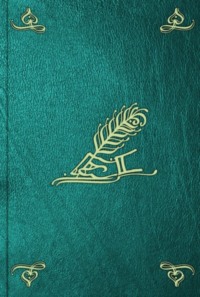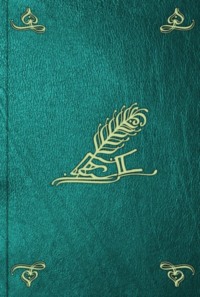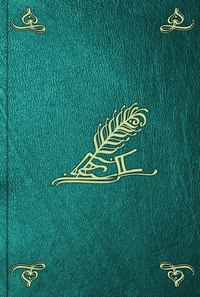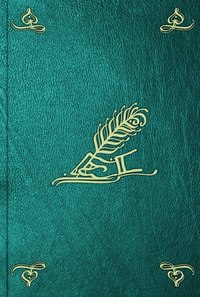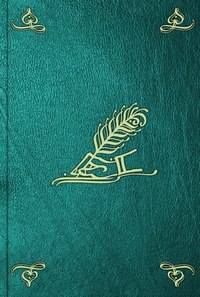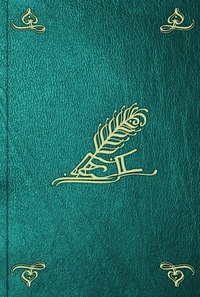 полная версия
полная версияLife and Letters of Charles Darwin — Volume 1
C. DARWIN.
CHARLES DARWIN TO J.D. HOOKER. Down, September 25th [1853].
My dear Hooker,
I have read your paper with great interest; it seems all very clear, and will form an admirable introduction to the New Zealand Flora, or to any Flora in the world. How few generalizers there are among systematists; I really suspect there is something absolutely opposed to each other and hostile in the two frames of mind required for systematising and reasoning on large collections of facts. Many of your arguments appear to me very well put, and, as far as my experience goes, the candid way in which you discuss the subject is unique. The whole will be very useful to me whenever I undertake my volume, though parts take the wind very completely out of my sails; it will be all nuts to me...for I have for some time determined to give the arguments on BOTH sides (as far as I could), instead of arguing on the mutability side alone.
In my own Cirripedial work (by the way, thank you for the dose of soft solder; it does one — or at least me — a great deal of good) — in my own work I have not felt conscious that disbelieving in the mere PERMANENCE of species has made much difference one way or the other; in some few cases (if publishing avowedly on doctrine of non-permanence), I should NOT have affixed names, and in some few cases should have affixed names to remarkable varieties. Certainly I have felt it humiliating, discussing and doubting, and examining over and over again, when in my own mind the only doubt has been whether the form varied TO-DAY OR YESTERDAY (not to put too fine a point on it, as Snagsby (In 'Bleak House.') would say). After describing a set of forms as distinct species, tearing up my MS., and making them one species, tearing that up and making them separate, and then making them one again (which has happened to me), I have gnashed my teeth, cursed species, and asked what sin I had committed to be so punished. But I must confess that perhaps nearly the same thing would have happened to me on any scheme of work.
I am heartily glad to hear your Journal (Sir J.D. Hooker's 'Himalayan Journal.') is so much advanced; how magnificently it seems to be illustrated! An "Oriental Naturalist," with lots of imagination and not too much regard to facts, is just the man to discuss species! I think your title of 'A Journal of a Naturalist in the East' very good; but whether "in the Himalaya" would not be better, I have doubted, for the East sounds rather vague...
CHARLES DARWIN TO J.D. HOOKER. [1853].
My dear Hooker,
I have no remarks at all worth sending you, nor, indeed, was it likely that I should, considering how perfect and elaborated an essay it is. ('New Zealand Flora,' 1853.) As far as my judgment goes, it is the most important discussion on the points in question ever published. I can say no more. I agree with almost everything you say; but I require much time to digest an essay of such quality. It almost made me gloomy, partly from feeling I could not answer some points which theoretically I should have liked to have been different, and partly from seeing SO FAR BETTER DONE than I COULD have done, discussions on some points which I had intended to have taken up...
I much enjoyed the slaps you have given to the provincial species-mongers. I wish I could have been of the slightest use: I have been deeply interested by the whole essay, and congratulate you on having produced a memoir which I believe will be memorable. I was deep in it when your most considerate note arrived, begging me not to hurry. I thank Mrs. Hooker and yourself most sincerely for your wish to see me. I will not let another summer pass without seeing you at Kew, for indeed I should enjoy it much...
You do me really more honour than I have any claim to, putting me in after Lyell on ups and downs. In a year or two's time, when I shall be at my species book (if I do not break down), I shall gnash my teeth and abuse you for having put so many hostile facts so confoundedly well.
Ever yours affectionately, C. DARWIN.
CHARLES DARWIN TO J.D. HOOKER. Down, March 26th [1854].
My dear Hooker,
I had hoped that you would have had a little breathing-time after your Journal, but this seems to be very far from the case; and I am the more obliged (and somewhat contrite) for the long letter received this morning, MOST juicy with news and MOST interesting to me in many ways. I am very glad indeed to hear of the reforms, etc., in the Royal Society. With respect to the Club (The Philosophical Club, to which my father was elected (as Professor Bonney is good enough to inform me) on April 24, 1854. He resigned his membership in 1864. The Club was founded in 1847. The number of members being limited to 47, it was proposed to christen it "the Club of 47," but the name was never adopted. The nature of the Club may be gathered from its first rule: "The purpose of the Club is to promote as much as possible the scientific objects of the Royal Society; to facilitate intercourse between those Fellows who are actively engaged in cultivating the various branches of Natural Science, and who have contributed to its progress; to increase the attendance at the evening meetings, and to encourage the contribution and discussion of papers." The Club met for dinner (at first) at 6, and the chair was to be quitted at 8.15, it being expected that members would go to the Royal Society. Of late years the dinner has been at 6.30, the Society meeting in the afternoon.), I am deeply interested; only two or three days ago, I was regretting to my wife, how I was letting drop and being dropped by nearly all my acquaintances, and that I would endeavour to go oftener to London; I was not then thinking of the Club, which, as far as any one thing goes, would answer my exact object in keeping up old and making some new acquaintances. I will therefore come up to London for every (with rare exceptions) Club-day, and then my head, I think, will allow me on an average to go to every other meeting. But it is grievous how often any change knocks me up. I will further pledge myself, as I told Lyell, to resign after a year, if I did not attend pretty often, so that I should AT WORST encumber the Club temporarily. If you can get me elected, I certainly shall be very much pleased. Very many thanks for answers about Glaciers. I am very glad to hear of the second Edition (Of the Himalayan Journal.) so very soon; but am not surprised, for I have heard of several, in our small circle, reading it with very much pleasure. I shall be curious to hear what Humboldt will say: it will, I should think, delight him, and meet with more praise from him than any other book of Travels, for I cannot remember one, which has so many subjects in common with him. What a wonderful old fellow he is...By the way, I hope, when you go to Hitcham, towards the end of May, you will be forced to have some rest. I am grieved to hear that all the bad symptoms have not left Henslow; it is so strange and new to feel any uneasiness about his health. I am particularly obliged to you for sending me Asa Gray's letter; how very pleasantly he writes. To see his and your caution on the species-question ought to overwhelm me in confusion and shame; it does make me feel deuced uncomfortable...It is delightful to hear all that he says on Agassiz: how very singular it is that so EMINENTLY clever a man, with such IMMENSE knowledge on many branches of Natural History, should write as he does. Lyell told me that he was so delighted with one of his (Agassiz) lectures on progressive development, etc., etc., that he went to him afterwards and told him, "that it was so delightful, that he could not help all the time wishing it was true." I seldom see a Zoological paper from North America, without observing the impress of Agassiz's doctrines — another proof, by the way, of how great a man he is. I was pleased and surprised to see A. Gray's remarks on crossing, obliterating varieties, on which, as you know, I have been collecting facts for these dozen years. How awfully flat I shall feel, if when I get my notes together on species, etc., etc., the whole thing explodes like an empty puff-ball. Do not work yourself to death.
Ever yours most truly, C. DARWIN.
CHARLES DARWIN TO J.D. HOOKER. Down, November 5th [1854].
My dear Hooker,
I was delighted to get your note yesterday. I congratulate you very heartily (On the award to him of the Royal Society's Medal.), and whether you care much or little, I rejoice to see the highest scientific judgment-court in Great Britain recognise your claims. I do hope Mrs. Hooker is pleased, and E. desires me particularly to send her cordial congratulations ...I pity you from the very bottom of my heart about your after-dinner speech, which I fear I shall not hear. Without you have a very much greater soul than I have (and I believe that you have), you will find the medal a pleasant little stimulus, when work goes badly, and one ruminates that all is vanity, it is pleasant to have some tangible proof, that others have thought something of one's labours.
Good-bye my dear Hooker, I can assure [you] that we both most truly enjoyed your and Mrs. Hooker's visit here. Farewell.
My dear Hooker, your sincere friend, C. DARWIN.
CHARLES DARWIN TO J.D. HOOKER. March 7 [1855].
...I have just finished working well at Wollaston's (Thomas Vernon Wollaston died (in his fifty-seventh year, as I believe) on January 4, 1878. His health forcing him in early manhood to winter in the south, he devoted himself to a study of the Coleoptera of Madeira, the Cape de Verdes, and St. Helena, whence he deduced evidence in support of the belief in the submerged continent of 'Atlantis.' In an obituary notice by Mr. Rye ('Nature,' 1878) he is described as working persistently "upon a broad conception of the science to which he was devoted," while being at the same time "accurate, elaborate, and precise ad punctum, and naturally of a minutely critical habit." His first scientific paper was written when he was an undergraduate at Jesus College, Cambridge. While at the University, he was an Associate and afterwards a Member of the Ray Club: this is a small society which still meets once a week, and where the undergraduate members, or Associates, receive much kindly encouragement from their elders.) 'Insecta Maderensia': it is an ADMIRABLE work. There is a very curious point in the astounding proportion of Coleoptera that are apterous; and I think I have guessed the reason, viz., that powers of flight would be injurious to insects inhabiting a confined locality, and expose them to be blown to the sea: to test this, I find that the insects inhabiting the Dezerte Grande, a quite small islet, would be still more exposed to this danger, and here the proportion of apterous insects is even considerably greater than on Madeira Proper. Wollaston speaks of Madeira and the other Archipelagoes as being "sure and certain witnesses of Forbes' old continent," and of course the Entomological world implicitly follows this view. But to my eyes it would be difficult to imagine facts more opposed to such a view. It is really disgusting and humiliating to see directly opposite conclusions drawn from the same facts.
I have had some correspondence with Wollaston on this and other subjects, and I find that he coolly assumes, (1) that formerly insects possessed greater migratory powers than now, (2) that the old land was SPECIALLY rich in centres of creation, (3) that the uniting land was destroyed before the special creations had time to diffuse, and (4) that the land was broken down before certain families and genera had time to reach from Europe or Africa the points of land in question. Are not these a jolly lot of assumptions? and yet I shall see for the next dozen or score of years Wollaston quoted as proving the former existence of poor Forbes' Atlantis.
I hope I have not wearied you, but I thought you would like to hear about this book, which strikes me as EXCELLENT in its facts, and the author a most nice and modest man.
Most truly yours, C. DARWIN.
CHARLES DARWIN TO W.D. FOX. Down, March 19th [1855].
My dear Fox,
How long it is since we have had any communication, and I really want to hear how the world goes with you; but my immediate object is to ask you to observe a point for me, and as I know now you are a very busy man with too much to do, I shall have a good chance of your doing what I want, as it would be hopeless to ask a quite idle man. As you have a Noah's Ark, I do not doubt that you have pigeons. (How I wish by any chance they were fantails!) Now what I want to know is, at what age nestling pigeons have their tail feathers sufficiently developed to be counted. I do not think I ever saw a young pigeon. I am hard at work at my notes collecting and comparing them, in order in some two or three years to write a book with all the facts and arguments, which I can collect, FOR AND VERSUS the immutability of species. I want to get the young of our domestic breeds, to see how young, and to what degree the differences appear. I must either breed myself (which is no amusement but a horrid bore to me) the pigeons or buy their young; and before I go to a seller, whom I have heard of from Yarrell, I am really anxious to know something about their development, not to expose my excessive ignorance, and therefore be excessively liable to be cheated and gulled. With respect to the ONE point of the tail feathers, it is of course in relation to the wonderful development of tail feathers in the adult fantail. If you had any breed of poultry pure, I would beg a chicken with exact age stated, about a week or fortnight old! To be sent in a box by post, if you could have the heart to kill one; and secondly, would let me pay postage...Indeed, I should be very glad to have a nestling common pigeon sent, for I mean to make skeletons, and have already just begun comparing wild and tame ducks. And I think the results rather curious ("I have just been testing practically what disuse does in reducing parts; I have made skeleton of wild and tame duck (oh, the smell of well-boiled, high duck!!) and I find the tame-duck wing ought, according to scale of wild prototype, to have its two wings 360 grains in weight, but it has it only 317." — A letter to Sir J. Hooker, 1855.), for on weighing the several bones very carefully, when perfectly cleaned the proportional weights of the two have greatly varied, the foot of the tame having largely increased. How I wish I could get a little wild duck of a week old, but that I know is almost impossible.
With respect to ourselves, I have not much to say; we have now a terribly noisy house with the whooping cough, but otherwise are all well. Far the greatest fact about myself is that I have at last quite done with the everlasting barnacles. At the end of the year we had two of our little boys very ill with fever and bronchitis, and all sorts of ailments. Partly for amusement, and partly for change of air, we went to London and took a house for a month, but it turned out a great failure, for that dreadful frost just set in when we went, and all our children got unwell, and E. and I had coughs and colds and rheumatism nearly all the time. We had put down first on our list of things to do, to go and see Mrs. Fox, but literally after waiting some time to see whether the weather would not improve, we had not a day when we both could go out.
I do hope before very long you will be able to manage to pay us a visit. Time is slipping away, and we are getting oldish. Do tell us about yourself and all your large family.
I know you will help me IF YOU CAN with information about the young pigeons; and anyhow do write before very long.
My dear Fox, your sincere old friend, C. DARWIN.
P.S. — Amongst all sorts of odds and ends, with which I am amusing myself, I am comparing the seeds of the variations of plants. I had formerly some wild cabbage seeds, which I gave to some one, was it to you? It is a THOUSAND to one it was thrown away, if not I should be very glad of a pinch of it.
[The following extract from a letter to Mr. Fox (March 27th, 1855) refers to the same subject as the last letter, and gives some account of the "species work: " "The way I shall kill young things will be to put them under a tumbler glass with a teaspoon of ether or chloroform, the glass being pressed down on some yielding surface, and leave them for an hour or two, young have such power of revivication. (I have thus killed moths and butterflies.) The best way would be to send them as you procure them, in pasteboard chip-box by post, on which you could write and just tie up with string; and you will REALLY make me happier by allowing me to keep an account of postage, etc. Upon my word I can hardly believe that ANY ONE could be so good-natured as to take such trouble and do such a very disagreeable thing as kill babies; and I am very sure I do not know one soul who, except yourself, would do so. I am going to ask one thing more; should old hens of any above poultry (not duck) die or become so old as to be USELESS, I wish you would send her to me per rail, addressed to C. Darwin, care of Mr. Acton, Post-office, Bromley, Kent." Will you keep this address? as shortest way for parcels. But I do not care so much for this, as I could buy the old birds dead at Baily to make skeletons. I should have written at once even if I had not heard from you, to beg you not to take trouble about pigeons, for Yarrell has persuaded me to attempt it, and I am now fitting up a place, and have written to Baily about prices, etc., etc. SOMETIME (when you are better) I should like very much to hear a little about your "Little Call Duck"; why so-called? And where you got it? and what it is like?.. I was so ignorant I do not even know there were three varieties of Dorking fowl: how do they differ?..
I forget whether I ever told you what the object of my present work is, — it is to view all facts that I can master (eheu, eheu, how ignorant I find I am) in Natural History (as on geographical distribution, palaeontology, classification, hybridism, domestic animals and plants, etc., etc., etc.) to see how far they favour or are opposed to the notion that wild species are mutable or immutable: I mean with my utmost power to give all arguments and facts on both sides. I have a NUMBER of people helping me in every way, and giving me most valuable assistance; but I often doubt whether the subject will not quite overpower me.
So much for the quasi-business part of my letter. I am very very sorry to hear so indifferent account of your health: with your large family your life is very precious, and I am sure with all your activity and goodness it ought to be a happy one, or as happy as can reasonably be expected with all the cares of futurity on one.
One cannot expect the present to be like the old Crux-major days at the foot of those noble willow stumps, the memory of which I revere. I now find my little entomology which I wholly owe to you, comes in very useful. I am very glad to hear that you have given yourself a rest from Sunday duties. How much illness you have had in your life! Farewell my dear Fox. I assure you I thank you heartily for your proffered assistance.]
CHARLES DARWIN TO W.D. FOX. Down, May 7th [1855].
My dear Fox,
My correspondence has cost you a deal of trouble, though this note will not. I found yours on my return home on Saturday after a week's work in London. Whilst there I saw Yarrell, who told me he had carefully examined all points in the Call Duck, and did not feel any doubt about it being specifically identical, and that it had crossed freely with common varieties in St. James's Park. I should therefore be very glad for a seven-days' duckling and for one of the old birds, should one ever die a natural death. Yarrell told me that Sabine had collected forty varieties of the common duck!..Well, to return to business; nobody, I am sure, could fix better for me than you the characteristic age of little chickens; with respect to skeletons, I have feared it would be impossible to make them, but I suppose I shall be able to measure limbs, etc., by feeling the joints. What you say about old cocks just confirms what I thought, and I will make my skeletons of old cocks. Should an old wild turkey ever die, please remember me; I do not care for a baby turkey, nor for a mastiff. Very many thanks for your offer. I have puppies of bull-dogs and greyhound in salt, and I have had cart-horse and race-horse young colts carefully measured. Whether I shall do any good I doubt. I am getting out of my depth.
Most truly yours, C. DARWIN.
[An extract from a letter to Mr. Fox may find a place here, though of a later date, viz. July, 1855]:
"Many thanks for the seven days' old white Dorking, and for the other promised ones. I am getting quite a 'chamber of horrors,' I appreciate your kindness even more than before; for I have done the black deed and murdered an angelic little fantail and pouter at ten days old. I tried chloroform and ether for the first, and though evidently a perfectly easy death, it was prolonged; and for the second I tried putting lumps of cyanide of potassium in a very large damp bottle, half an hour before putting in the pigeon, and the prussic acid gas thus generated was very quickly fatal."
A letter to Mr. Fox (May 23rd, 1855) gives the first mention of my father's laborious piece of work on the breeding of pigeons:
"I write now to say that I have been looking at some of our mongrel chickens, and I should say ONE WEEK OLD would do very well. The chief points which I am, and have been for years, very curious about, is to ascertain whether the YOUNG of our domestic breeds differ as much from each other as do their parents, and I have no faith in anything short of actual measurement and the Rule of Three. I hope and believe I am not giving so much trouble without a motive of sufficient worth. I have got my fantails and pouters (choice birds, I hope, as I paid 20 shillings for each pair from Baily) in a grand cage and pigeon-house, and they are a decided amusement to me, and delight to H."
In the course of my father's pigeon-fancying enterprise he necessarily became acquainted with breeders, and was fond of relating his experiences as a member of the Columbarian and Philoperistera Clubs, where he met the purest enthusiasts of the "fancy," and learnt much of the mysteries of their art. In writing to Mr. Huxley some years afterwards, he quotes from a book on 'Pigeons' by Mr. J. Eaton, in illustration of the "extreme attention and close observation" necessary to be a good fancier.
"In his [Mr. Eaton's] treatise, devoted to the Almond Tumbler ALONE, which is a sub-variety of the short-faced variety, which is a variety of the Tumbler, as that is of the Rock-pigeon, Mr. Eaton says: 'There are some of the young fanciers who are over-covetous, who go for all the five properties at once [i.e., the five characteristic points which are mainly attended to, — C.D.], they have their reward by getting nothing.' In short, it is almost beyond the human intellect to attend to ALL the excellencies of the Almond Tumbler!
"To be a good breeder, and to succeed in improving any breed, beyond everything enthusiasm is required. Mr. Eaton has gained lots of prizes, listen to him.
"'If it was possible for noblemen and gentlemen to know the amazing amount of solace and pleasure derived from the Almond Tumbler, when they begin to understand their (i.e., the tumbler's) properties, I should think that scarce any nobleman or gentleman would be without their aviaries of Almond Tumblers.'"
My father was fond of quoting this passage, and always with a tone of fellow-feeling for the author, though, no doubt, he had forgotten his own wonderings as a child that "every gentleman did not become an ornithologist." — ('Autobiography,' page 32.)
To Mr. W.B. Tegetmeier, the well-known writer on poultry, etc., he was indebted for constant advice and co-operation. Their correspondence began in 1855, and lasted to 1881, when my father wrote: "I can assure you that I often look back with pleasure to the old days when I attended to pigeons, fowls, etc., and when you gave me such valuable assistance. I not rarely regret that I have had so little strength that I have not been able to keep up old acquaintances and friendships." My father's letters to Mr. Tegetmeier consist almost entirely of series of questions relating to the different breeds of fowls, pigeons, etc., and are not, therefore interesting. In reading through the pile of letters, one is much struck by the diligence of the writer's search for facts, and it is made clear that Mr. Tegetmeier's knowledge and judgment were completely trusted and highly valued by him. Numerous phrases, such as "your note is a mine of wealth to me," occur, expressing his sense of the value of Mr. Tegetmeier's help, as well as words expressing his warm appreciation of Mr. Tegetmeier's unstinting zeal and kindness, or his "pure and disinterested love of science." On the subject of hive-bees and their combs, Mr. Tegetmeier's help was also valued by my father, who wrote, "your paper on 'Bees-cells,' read before the British Association, was highly useful and suggestive to me."



